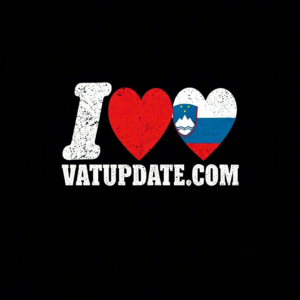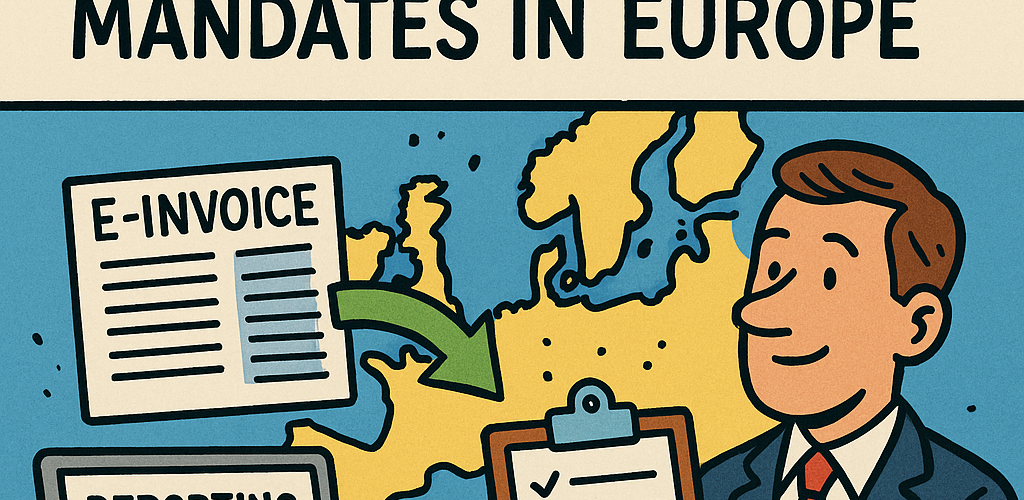Click HERE for Podcasts on E-Invoicing, E-Reporting and SAF-T mandates on Spotify
Belgium

✅ Scope and Applicability
- Who is affected: All VAT-registered businesses established in Belgium.
- Exemptions: Non-established entities (foreign businesses without a permanent establishment in Belgium) are excluded from the mandate.
- Transaction types: Applies to domestic B2B transactions taxable in Belgium.
- Exclusions: Business-to-consumer (B2C) transactions and certain exempt transactions are not covered.
Invoice Format and Transmission
- Format: Structured electronic invoices conforming to the Peppol BIS standard.
- Transmission: Invoices must be exchanged via the Peppol network, ensuring interoperability between different systems.
Implementation Timeline
- Effective date: 1 January 2026.
- Legislative status: The Belgian Parliament has enacted the necessary legislation.
Future Developments: E-Reporting
- Planned introduction: 2028
- Objective: Implement near real-time reporting of invoice data to the Belgian tax authorities, enhancing VAT compliance and reducing fraud.
️ Preparing for Compliance
Belgian businesses should:
- Assess and upgrade their invoicing systems to support structured electronic invoices in the Peppol BIS format.
- Engage with Peppol Access Points to facilitate the exchange of e-invoices.
- Train staff on new invoicing procedures and compliance requirements.
- Monitor updates from the Belgian tax authorities and the European Commission regarding the final approval and any potential changes to the mandate.
Croatia

Croatia is progressing with its plan to implement mandatory electronic invoicing (e-invoicing) for Business-to-Business (B2B) transactions, as part of its broader Fiscalization Project 2.0.
Implementation Timeline
- 1 September 2025: The Fiscalization Act is expected to come into effect, excluding specific e-invoicing-related articles. This date also marks the beginning of the testing phase for e-invoice exchange and fiscalization systems, allowing taxpayers and intermediaries to prepare for the upcoming mandates.
- 1 January 2026: Mandatory e-invoicing and e-reporting requirements commence for VAT-registered businesses. From this date, these entities are obligated to issue and receive electronic invoices for domestic B2B transactions.
- 1 January 2027: The obligation to issue e-invoices extends to non-VAT registered entities, including small businesses, sole traders, liberal professions, and public sector organizations.
Key Features of the E-Invoicing System
- Standardization: Croatia’s e-invoicing will adhere to the EN 16931 standard with local extensions, ensuring compatibility and interoperability within the European Union.
- Platforms and Tools:
- e-Račun: The national e-invoicing platform managed by the Financial Agency (FINA), facilitating the exchange of electronic invoices.
- FiskApplication: A government reporting portal for e-invoicing and e-reporting submissions.
- MICROeINVOICE: A free application provided by the government to assist small businesses in complying with e-invoicing requirements.
- Scope: The mandate applies to domestic transactions between resident businesses. Cross-border transactions will continue to be handled via paper invoices or other agreed formats.
✅ Preparatory Steps for Businesses
- System Assessment: Evaluate current invoicing and accounting systems to ensure compatibility with the EN 16931 standard and the e-Račun platform.
- Testing Phase Participation: Engage in the testing phase starting 1 September 2025 to identify and address any technical issues before the mandatory implementation.
- Staff Training: Provide training for relevant personnel on the new e-invoicing procedures and the use of associated platforms and tools.
- Stay Informed: Monitor updates from the Croatian Ministry of Finance and FINA regarding any changes to the implementation timeline or technical specifications.
Estonia

Estonia is advancing its electronic invoicing (e-invoicing) framework with a phased approach aimed at enhancing VAT compliance and streamlining business transactions.
Current Status of E-Invoicing in Estonia
✅ Business-to-Government (B2G) E-Invoicing
- Mandatory Since: 1 July 2019
- Requirement: Suppliers to all public sector entities must issue structured e-invoices.
- Accepted Formats: European standard EN 16931, Estonian national XML-based standards (EVS 923:2014 and EVS 923:2014/AC:2017), and PDF from foreign suppliers.
- ⏳ Business-to-Business (B2B) E-Invoicing
- Effective Date: 1 July 2025
- Requirement: Buyers registered as e-invoice recipients in the Estonian Commercial Register can request e-invoices from their suppliers.
- Default Format: European standard EN 16931, unless another format is mutually agreed upon.
Future Developments
-
Planned Mandate: By 2027, Estonia intends to implement a general B2B e-invoicing mandate, requiring all VAT-registered businesses to issue and receive e-invoices.
️ Technical and Compliance Details
- Transmission Methods: E-invoices can be exchanged directly between parties or via commercial intermediaries.
- E-Signature: Not required for e-invoices.
- Archiving Requirements:
- Movable property: 7 years
- Immovable property: 10 years
- Archiving abroad is permitted under certain conditions.
Summary
- B2G E-Invoicing: Mandatory since 2019 for all suppliers to public sector entities.
- B2B E-Invoicing: From 1 July 2025, buyers can request e-invoices; a full mandate is planned for 2027.
- Action Items for Businesses:
- Ensure systems are capable of issuing and receiving e-invoices in the required formats.
- Register as an e-invoice recipient in the Estonian Commercial Register if you wish to request e-invoices.
- Stay informed about legislative developments regarding the planned 2027 B2B e-invoicing mandate.
France

France is advancing its mandatory electronic invoicing (e-invoicing) and e-reporting reforms for domestic Business-to-Business (B2B) transactions. The implementation timeline has been adjusted to provide businesses with additional preparation time.
Updated Implementation Timeline
- 1 September 2026:
- All VAT-registered businesses in France must be capable of receiving e-invoices.
- Large and medium-sized enterprises are required to issue e-invoices and comply with e-reporting obligations.
- 1 September 2027:
- Small and micro-enterprises must begin issuing e-invoices and fulfilling e-reporting requirements.
Key Requirements
- Invoice Formats: Accepted formats include Factur-X (a hybrid of PDF and XML), UBL, and CII.
- Transmission Channels:
- Invoices must be transmitted through certified Partner Dematerialization Platforms (PDPs).
- The Portail Public de Facturation (PPF) will serve as the central public invoicing portal.
- E-Reporting: In addition to e-invoicing, businesses must report transaction data for cross-border B2B, B2C, and exempt transactions to the tax authorities.
⚠️ Penalties for Non-Compliance
- E-Invoicing: €15 per invoice, capped at €15,000 annually.
- E-Reporting: €250 per transmission, capped at €45,000 annually.
✅ Recommended Actions for Businesses
- Select a Certified PDP: Engage with a certified Partner Dematerialization Platform to facilitate compliant invoice transmission and reception.
- System Integration: Ensure your accounting and invoicing systems are compatible with the required formats and capable of interfacing with PDPs and the PPF.
- Staff Training: Educate relevant personnel on the new e-invoicing and e-reporting processes to ensure smooth adoption.
- Monitor Regulatory Updates: Stay informed about any further changes to the implementation timeline or technical specifications.
- By proactively preparing for these changes, businesses can ensure compliance and benefit from streamlined invoicing processes.
Germany

Germany is progressing with its phased implementation of mandatory electronic invoicing (e-invoicing) for domestic Business-to-Business (B2B) transactions, as outlined in the Wachstumschancengesetz (Growth Opportunities Act).
Implementation Timeline
- 1 January 2025: All businesses must be capable of receiving structured electronic invoices compliant with the European standard EN 16931. During this period, issuing e-invoices remains optional, and businesses may continue using paper or non-structured electronic invoices with the recipient’s consent.
- 1 January 2027: Issuing e-invoices becomes mandatory for businesses with an annual turnover exceeding €800,000.
- 1 January 2028: All businesses, regardless of size, are required to issue e-invoices for domestic B2B transactions.
Definition and Accepted Formats
- E-Invoice Definition: An invoice issued, transmitted, and received in a structured electronic format that enables electronic processing.
- Accepted Formats: Invoices must comply with EN 16931. Accepted syntaxes include XRechnung and ZUGFeRD (version 2.0.1 or higher).
- Non-Compliant Invoices: PDFs and paper invoices are considered “other invoices” and will not be valid for VAT deductions unless specific transitional rules apply.
Scope and Exemptions
- Scope: The mandate applies to domestic B2B transactions between businesses established in Germany.
- Exemptions: Certain transactions are exempt, including:
- Intra-Community transactions
- Simplified invoices
- Invoices under €250
- Tickets for transportation services
️ Business-to-Government (B2G) E-Invoicing
- Mandatory Since: 18 April 2020
- Requirement: Suppliers to federal public authorities must submit e-invoices compliant with EN 16931.
- Decentralized Implementation: Each federal state (Bundesland) has its own regulations and systems for e-invoicing, leading to a decentralized approach.
✅ Action Steps for Businesses
- Assess Readiness: Ensure your business can receive e-invoices in the required formats by 1 January 2025.
- System Integration: Upgrade or adapt your invoicing systems to support EN 16931-compliant formats such as XRechnung or ZUGFeRD.
- Staff Training: Educate relevant personnel on the new e-invoicing requirements and processes.
- Monitor Updates: Stay informed about any changes or updates to the e-invoicing regulations and timelines.
Latvia

✅ Business-to-Government (B2G) E-Invoicing
- Effective Date: 1 January 2025
- Requirement: All companies registered in Latvia must issue structured electronic invoices to Latvian budgetary institutions.
- Technical Standards: Invoices must comply with the XML format and the Pan-European Public Procurement On-Line Business Interoperability Specifications (PEPPOL BIS) Billing 3.0 standard.
⏳ Business-to-Business (B2B) E-Invoicing
- Original Effective Date: 1 January 2026 – Delayed to 2027?
- Proposed Postponement: A draft law suggests delaying the mandatory B2B e-invoicing implementation to 1 January 2027. This proposal is currently under review by the Budget and Finance (Tax) Committee and has not yet been approved.
- Reason for Delay: The postponement is due to several factors, including the government’s delay in issuing necessary regulations, the need for businesses and software providers to adapt their systems amid uncertainty about the scope of e-invoices, and the urgency to revise VAT legislation to ensure proper input tax deduction.
️ Technical and Compliance Details
- Invoice Format: Structured XML complying with PEPPOL BIS Billing 3.0.
- Submission: E-invoice data must be submitted to the State Revenue Service (SRS) through a centralized portal.
- Transmission Methods:
- Government’s e-address platform.
- PEPPOL service providers.
- Direct methods between businesses, provided both parties agree.
- E-Signature: Not required.
- Archiving:
- 5 years for goods and services.
- 10 years for real estate transactions.
- Archiving abroad is allowed under certain conditions.
Poland

Poland is advancing its mandatory electronic invoicing (e-invoicing) initiative through the National e-Invoice System (Krajowy System e-Faktur, or KSeF). The implementation is structured in phases to accommodate businesses of varying sizes and capacities.
Implementation Timeline
- 1 February 2026: Mandatory e-invoicing via KSeF for large taxpayers with annual sales exceeding PLN 200 million (approximately €46 million).
- 1 April 2026: All other VAT-registered businesses are required to comply with e-invoicing mandates.
- 1 January 2027: Micro-entrepreneurs and digitally excluded taxpayers—those issuing invoices up to PLN 450 each and not exceeding PLN 10,000 in total monthly sales—must begin compliance.
Key Features of KSeF
- Invoice Format: Structured XML format adhering to the FA(3) schema.
- Transmission: Invoices are submitted through the KSeF platform, either via API integration or the Taxpayer Application provided by the Ministry of Finance.
- Validation: Each invoice receives a unique identification number upon successful validation within KSeF.
- Offline Mode: An “Offline24” mode allows for invoice issuance during system downtimes, with submission required by the next working day.
⚠️ Compliance and Penalties
- Grace Period: No penalties will be imposed for e-invoicing errors until the end of 2026, providing businesses time to adapt.
- Payment References: The requirement to include KSeF invoice numbers in payment descriptions has been postponed until after 2026.
️ Preparation Steps for Businesses
- System Integration: Ensure your accounting and invoicing systems are compatible with the FA(3) XML schema and can interface with KSeF.
- Testing: Utilize the testing environments provided by the Ministry of Finance, with API testing available from 30 September 2025 and the Taxpayer Application from November 2025.
- Authentication: Apply for invoice issuer certificates starting 1 November 2025 to authenticate and authorize invoice submissions.
- Staff Training: Educate relevant personnel on the new e-invoicing processes and compliance requirements.
Slovakia

As of May 2025, Slovakia is advancing its e-invoicing framework, aiming to enhance tax compliance and align with the European Union’s VAT in the Digital Age (ViDA) initiative.
Implementation Timeline
- 1 January 2027: Mandatory e-invoicing and real-time reporting for domestic Business-to-Business (B2B) transactions will commence. All VAT-registered businesses will be required to issue, receive, and store structured electronic invoices compliant with the European standard EN 16931. vatcalc.com
- 1 July 2030: Expansion of e-invoicing and reporting obligations to include intra-community (cross-border) B2B transactions, in line with the EU’s ViDA package.
Key Features of the E-Invoicing System
- Decentralized Model: Slovakia plans to implement a five-corner, decentralized e-invoicing model, leveraging the Peppol network. The Financial Administration will serve as the national Peppol Authority, facilitating secure and standardized electronic document exchange.
- IS EFA Platform: The Information System for Electronic Invoicing (IS EFA) will be utilized for processing e-invoices, particularly for Business-to-Government (B2G) transactions. Currently, e-invoicing via IS EFA is mandatory for certain B2G transactions exceeding €5,000.
- Real-Time Reporting: Alongside e-invoicing, businesses will be required to report invoice data to the Financial Administration in real time, enhancing transparency and reducing VAT fraud.
✅ Preparation Steps for Businesses
- System Integration: Assess and update accounting and invoicing systems to ensure compatibility with the EN 16931 standard and the Peppol network.
- Engage with Service Providers: Collaborate with certified e-invoicing service providers to facilitate seamless integration and compliance.
- Staff Training: Educate relevant personnel on new e-invoicing procedures and compliance requirements.
- Monitor Regulatory Updates: Stay informed about legislative developments and technical specifications issued by the Slovak Financial Administration.
Slovenia

Slovenia is preparing to implement mandatory Business-to-Business (B2B) electronic invoicing (e-invoicing) as part of its efforts to enhance tax compliance and reduce VAT fraud.
Implementation Timeline
- 1 January 2027: Mandatory B2B e-invoicing will come into effect for all taxable persons. This date reflects a postponement from the initially planned July 2026 implementation, providing businesses with additional time to adapt.
- July 2025: Mandatory electronic VAT reporting (e-poročanje) begins. All VAT-registered businesses will be required to submit VAT records, including invoice data, electronically through the e-Davki portal.
Key Features of the B2B E-Invoicing Mandate
- Scope: The mandate applies to domestic B2B transactions between taxable persons. Business-to-Consumer (B2C) transactions are excluded, although electronic invoicing can be used with the customer’s consent.
- Invoice Formats:
- National e-SLOG standard.
- Formats compliant with the European standard EN 16931.
- Other internationally recognized formats, subject to mutual agreement between the issuer and recipient.
- Transmission Methods:
- Certified e-invoicing service providers (requiring ISO/IEC 27001 certification).
- Peppol network or Peppol-certified access points.
- Direct transmission via the taxpayer’s billing systems.
- Reporting Requirements: The initial proposal for real-time or near-real-time reporting has been removed. Under the revised draft law, there is no obligation for real-time reporting of e-invoices to the Financial Administration of the Republic of Slovenia (FURS).
✅ Preparation Steps for Businesses
- System Assessment: Evaluate current invoicing and accounting systems to ensure compatibility with the e-SLOG standard and the Peppol network.
- Service Provider Engagement: Consider partnering with certified e-invoicing service providers that meet the ISO/IEC 27001 certification requirement.
- Staff Training: Educate relevant personnel on the new e-invoicing procedures and compliance requirements.
- Monitor Regulatory Updates: Stay informed about any changes or updates to the e-invoicing regulations and timelines issued by FURS.
Latest Posts in "European Union"
- EU Parliament Mandates EPR Schemes for Textiles, Impacting Producers and Online Sales
- EU Deforestation Regulation Faces Another Delay Amid Technical and Political Challenges
- New Members Appointed to VAT Expert Group by Taxation and Customs Union
- IT Providers Invited to Shape EU Customs Data Hub: Market Readiness Survey Open
- Apply Now: EU Customs Certificate of Recognition Deadline Extended to December 31, 2025














